The Hawaii housing market has long been a hotspot for real estate investors. Its high demand, limited land supply, and strong tourism industry all contribute to consistent property appreciation. With the number of Hawaii homes for sale increasing and the number of buyers fluctuating depending on the area, investors are wondering: is Hawaii real estate a good investment in 2025?
At Defy Mortgage, we specialize in helping entrepreneurs, freelancers, and real estate investors navigate unique investment situations. From fully customizable DSCR loans to bank statement loans and foreign national loans, we can equip you with the tools you need to take the next step toward financial success.
In this blog, we’ll take a look at the current state of the Hawaii property market. We’ll discuss what makes Hawaii a highly desirable investment and the challenges investors must work around in 2025. We’ll also go over the best strategies, financing options, and locations for investing in Hawaii’s changing real estate landscape.
Let’s dive right in!
The Investor Appeal of Hawaii’s Housing Market
Hawaii’s unique geography, natural beauty, and policies have all made it a high-value real estate market. These features have consistently increased the list price of Hawaii homes for sale over the past few decades. Let’s break down each of the advantages of real estate investing in the Aloha state:
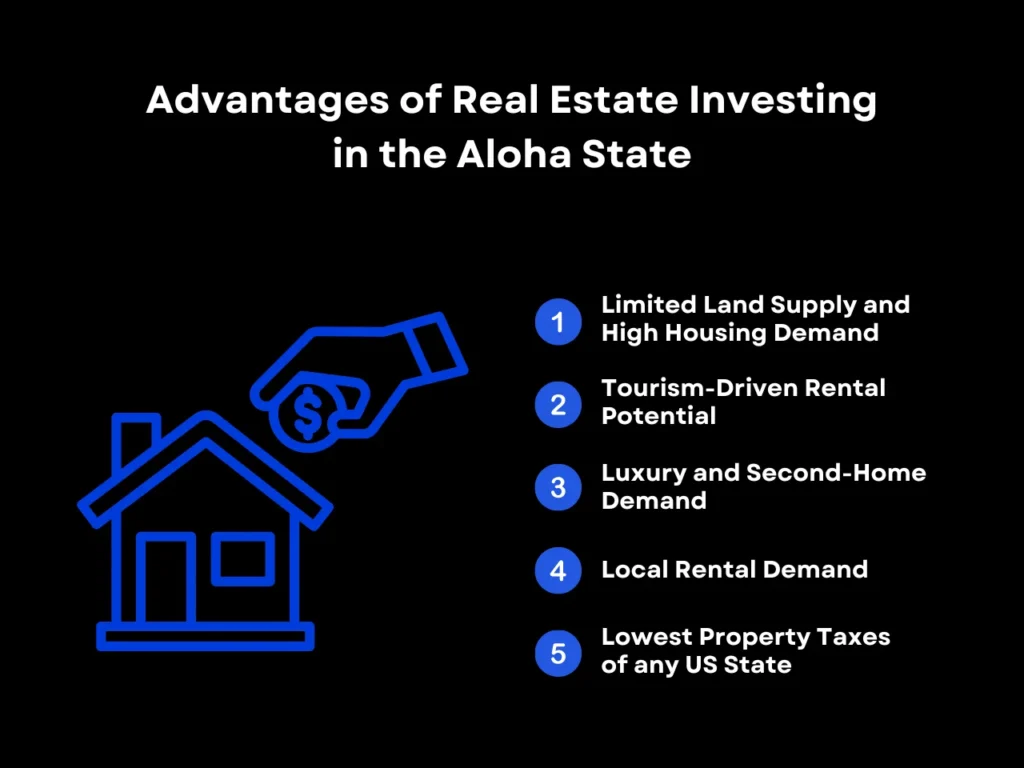
Limited Land Supply and High Housing Demand
Hawaii’s geographic constraints and strict land-use regulations result in a limited supply of developable land. This scarcity, coupled with high demand from both local and international buyers, keeps property prices consistently elevated.
Tourism-Driven Rental Potential
The state’s robust tourism industry fuels demand for short-term vacation rentals, particularly in popular destinations such as Waikiki and Maui. Vacation rentals near popular attractions can yield substantial returns thanks to Hawaii’s year-long tourist season. Other property types can generally benefit from this to a certain degree as well.
Luxury and Second-Home Demand
Hawaii’s allure as a tropical paradise attracts high-net-worth individuals seeking luxury properties and second homes. Communities like Kilauea on Kauai’s North Shore exemplify this trend, with median listing prices reaching $4.1 million as of December 2024. The limited inventory and unique offerings in such areas make them particularly appealing to affluent buyers.
Local Rental Demand
As housing affordability becomes a growing concern for residents, the demand for long-term rentals has intensified. Average rent across Hawaii rose from $2,900 in 2024 to $3,000 in 2025.
Steady demand makes providing rental housing to local communities highly lucrative. For investors who are looking to buy and hold properties in Hawaii, this can generate a significant amount of rental income that can offset investment expenses.
Lowest Property Taxes of any US State
HI has one of the lowest property tax rates in the United States, typically around 0.3% in most areas and as low as 0.18% in Maui. With the average single-family home in Hawaii costing around $980,000, you will only have to pay $2,940 in taxes. Contrast that with Miami, where single-family homes sell for a median price of $625,000, which is more affordable. But given the property tax rate is 0.82%, the average property owner in Miami will have to pay $5,125 in taxes every year.
Since property taxes are levied annually, the recurring expense can cut into investors’ returns on investment, making Hawaii’s lower rates an even greater advantage for buy-and-hold strategies.
Challenges Investors Face in the Hawaii Housing Market
Despite the strong return potential of owning property in Hawaii, there are a few challenges that you might have to navigate to protect your investment and optimize profits:
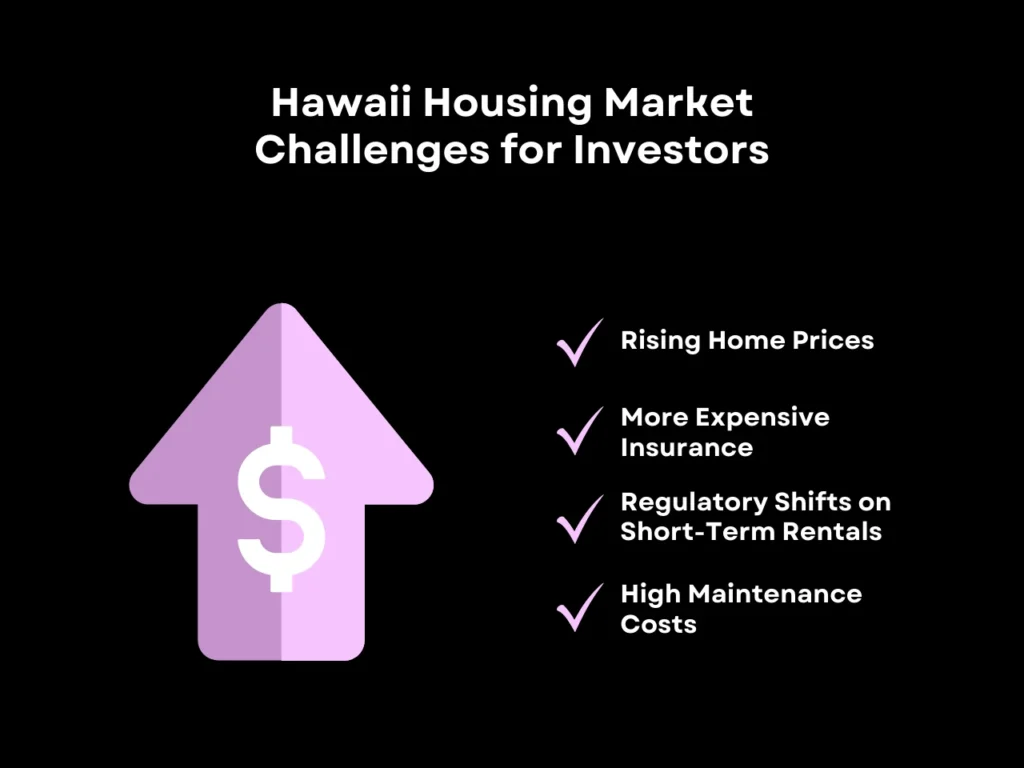
Rising Home Prices
Hawaii’s real estate market has seen consistent price growth over the past few decades, with the median list price for all homes, including condominiums and townhomes, currently at around $740,000. For single-family homes specifically, this figure goes up to $975,500, a year-over-year increase of 5.3%, according to Redfin. That’s around $689 per sq. ft.
Due to high prices, demand is beginning to decline in certain areas, affecting the return potential of resales. While rising prices do assure appreciation over time, which is great when it comes time to access home equity or sell, they can also make it more challenging to acquire properties in general.
More Expensive Insurance
Hawaii’s idyllic island setting also makes it vulnerable to natural disasters, such as volcanic eruptions, wildfires, and tsunamis. These events can cause extensive property damage.
Due to the historically higher risk, some insurance providers have withdrawn their services from high-risk areas, as we are seeing in areas like Puna on the Big Island. Houses in these areas can be more affordable than other Hawaii homes for sale, but they are also much more at risk from environmental hazards and often come with expensive insurance premiums.
Regulatory Shifts on Short-Term Rentals
In recent years, the State of Hawaii and its county authorities have imposed stricter regulations on vacation rentals. This includes fining illegal rentals or requiring additional permits, giving the county more control over short-term rentals.
Navigating Hawaii’s tightening regulations requires an understanding of the latest policies around vacation rentals. If you’re looking to invest in Hawaii, particularly in its short-term rental market, research county-specific rules and seek properties that are zoned specifically for such purposes.
Higher Maintenance Costs
Due to a combination of factors, the average annual maintenance costs of owning a home in Hawaii can be 20-50% higher than the U.S. mainland average. 90% of building materials in Hawaii are imported from the mainland. The higher property values and staffing shortage on the islands also contribute to the higher costs. As an investor, you should consider budgeting 2-4% of home value towards maintenance every year.
Investment Strategies That Still Work in Hawaii (Maui, Kauai, Hana)
Several tried-and-true investment strategies can still work for owning property in Hawaii. We’ll tailor each for Hawaii’s housing market and explore the best financial options available:
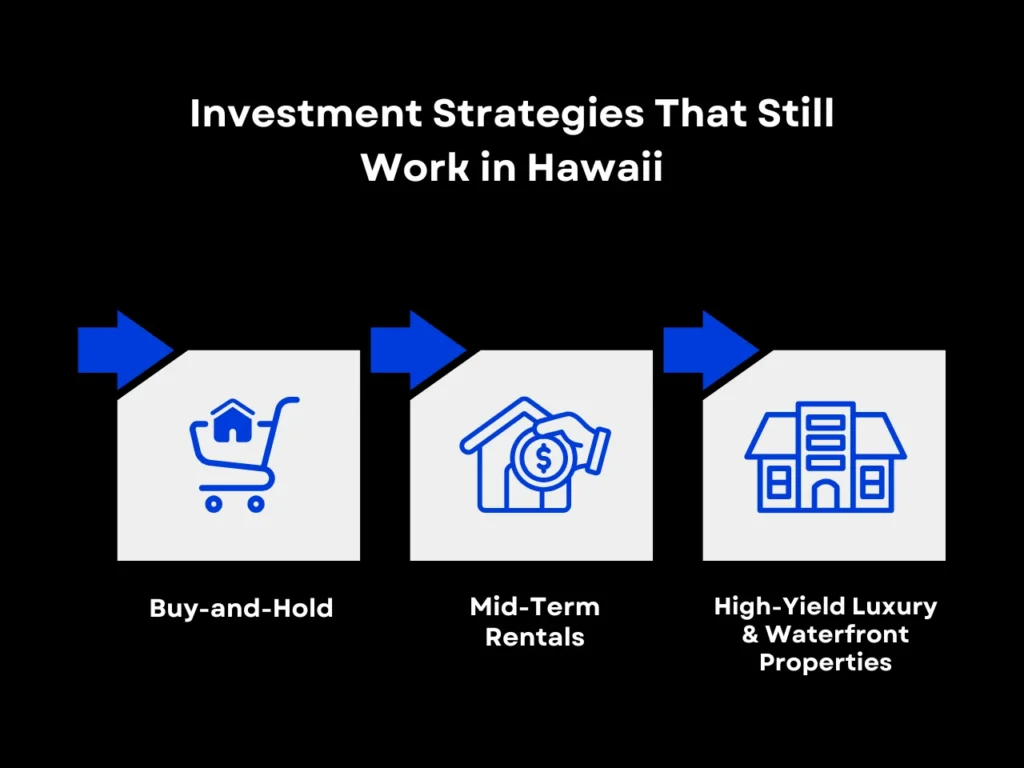
1. Buy-and-Hold for Long-Term Growth
Areas like Honolulu and Maui have historically demonstrated robust property value growth, making them attractive for those looking to hold properties over extended periods.
Debt service coverage ratio (DSCR) loans are particularly suited for this strategy if you’re considering using the property’s projected rental income to cover your mortgage expenses. Unlike traditional loans, DSCR loans base their terms on the property’s income-generating potential rather than the borrower’s personal income. If the lender believes that your property can perform well as a rental, you can secure favorable rates and more negotiating power to secure higher-value properties.
If, for any reason, you’re not inclined to rent out your investment, you can still rely on jumbo loans to finance high-end properties. Jumbo loans are not subject to the same conforming loan limits as conventional loans, which only go up to $1.2 million for single-family homes in Hawaii.
Please note that Defy Mortgage doesn’t currently offer Jumbo loans in HI.
2. Mid-Term Rentals for Stable Cash Flow
Mid-term rentals (MTRs), which are commonly leased for periods between one to six months, are another rental option that can provide consistent cash flow. Catering to remote workers, business professionals, students, traveling nurses, and other itinerant individuals, mid-term rentals offer a viable alternative to long-term and short-term rentals.
MTRs generally don’t face the same restrictions as short-term rentals. Additionally, since tenants tend to stay for longer, they’re more likely to treat the space as their own, avoiding costly repairs and maintenance expenses.
As with any rental, DSCR loans are also well-suited to MTRs. Demand for this type of property is growing due to the increasing number of remote workers and digital nomads, and the rising need for corporate housing. This ensures consistent occupancy and rental income growth for years to come.
3. High-Yield Luxury and Waterfront Properties
Luxury homes, particularly in Maui and the Big Island, continue to attract affluent buyers and renters, offering the potential for substantial returns. These high-end properties often come with premium rental rates and appreciation potential.
Financing such investments can also be streamlined through DSCR loans, which provide favorable terms for high-value properties. For example, Kilauea, a community on Kauai’s North Shore, has emerged as Hawaii’s most expensive ZIP code, with a median listing price of $4.1 million as of December 2024. Average rents in Kilauea are reported to be between $3,800 and $6,500–between 2 and 4 times the national average.
Jumbo loans, with loan amounts north of $4 million, are also well-suited to luxury purchases. At Defy, we provide jumbo loans to borrowers with FICO scores of at least 700 in states like Tennessee, Texas, Florida and Colorado. Their large size allows you to enter exclusive markets like Kilauea or secure the purchase of high-value properties in other markets. Although we do not currently offer Jumbo loans in Hawaii, we do offer DSCR loans in Hawaii.
If you’re a foreign national who doesn’t have a US Social Security number or credit score, we also offer foreign national DSCR loans. These loans function the same way as regular DSCR loans, except that instead of a US SSN or FICO score, we verify your income, assets, and work history using references, bank statements, and other documentation from your country of origin. With foreign national loans, you can purchase and invest in the highly lucrative Hawaii real estate market without needing to apply for a US Social Security number or build up a US credit score.
Why DSCR Loans Make Sense for Hawaii Investors Right Now
Debt service coverage ratio (DSCR) loans have become one of the most effective tools for Hawaii investors. Let’s explore the various advantages this financing option provides in the Hawaii housing market:
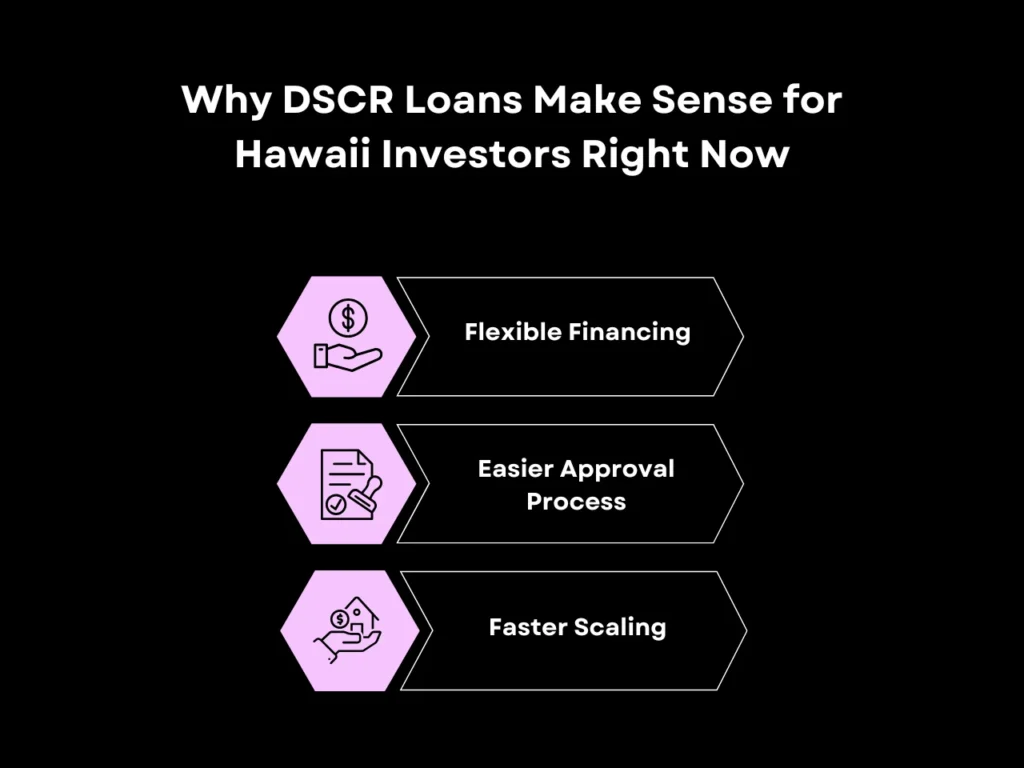
- Flexible financing: Qualifying for a DSCR loan primarily involves selecting a property with high cash flow potential, with your own financial credentials a distant second. Whether short-term, mid-term, or long-term, DSCR loan terms like loan amounts, LTV, and loan rates get better the more a property can earn per year.
- Easier approval process: DSCR loans don’t require the same stringent underwriting process as conventional loans. Most lenders will not ask you for tax returns or pay stubs, making approval easier and faster.
- Faster scaling: There’s no hard limit on the number of DSCR loans you can have active at a time. As long as you can secure approval from lenders, you can keep taking out DSCR loans, allowing you to swiftly expand your portfolio.
Why Jumbo Loans Can Also Make Sense for Hawaii Investors Right Now
Designed for high-end purchases, jumbo loans can provide amounts far above that of conventional and even DSCR loans. Here’s what jumbo loans bring to the table:
- Access to higher-value properties: With higher loan amounts, jumbo loans can be a good alternative to conventional and DSCR loans if you need to secure a particularly expensive property. With more money available, you’re able to put down a highly competitive offer, allowing you to easily outbid the competition.
- Access to more desirable markets: Larger amounts also unlock opportunities in markets that may not normally be available. This lets you tap into the high appreciation of expensive markets like Waikiki, Lahaina, and Kilauea.
- Not dependent on rental income: Unlike DSCR loans, jumbo loan terms are determined more traditionally, based on the borrower’s financial profile. This means you will have to have a fairly good credit score and some cash reserves to get the best chances of approval, but your loan terms will not depend on rental income potential. This makes jumbo loans more effective than DSCR loans in areas with high property values but low rental demand.
- Competitive terms: Despite their size, jumbo loans have comparable interest rates and loan terms to conventional and DSCR loans.
The Best Locations for Investing in Hawaii Real Estate in 2025
The best locations to invest in will ultimately depend on your goals, risk tolerance, and available resources. Let’s highlight certain locations in Hawaii that are particularly well-suited for investment opportunities:
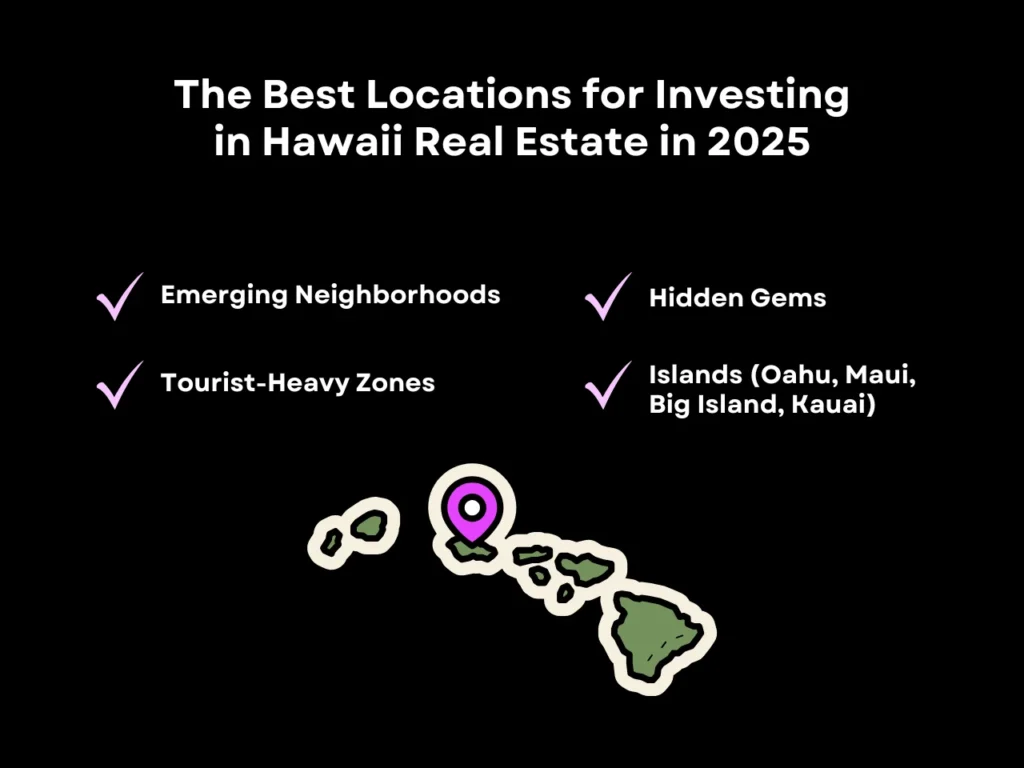
Emerging Neighborhoods
Investors seeking affordable options with growth potential should consider emerging neighborhoods on the Big Island and Kauai. For instance, Keaau has been identified as an up-and-coming market, with typical home values going from $301,000 in February 2020 to $452,059 in February 2025, according to the Zillow Home Value Index. Neighborhoods like Keaau are not very competitive, but their consistent appreciation rate makes properties in these areas promising investments.
Tourist-Heavy Zones
Areas with high tourist activity, such as Waikiki on Oahu, Lahaina on Maui, and Kailua-Kona on the Big Island, continue to offer profitable investment opportunities despite evolving rental regulations. Kailua-Kona, in particular, benefits from a strong tourism industry, with an average monthly market rent of around $3,000 as of March 2025, over $1,000 above the US national average.
Hidden Gems
Overlooked areas like Hilo are gaining attention for their affordability and appreciation potential. With the majority of Hawaii visitors flocking to beach areas, Hilo is not as popular as Maui or Kona because it’s mostly surrounded by rainforests. However, a growing number of tourists are starting to appreciate Hilo as one of the best places to experience authentic Hawaiian culture.
Comparing Islands
- Oahu: Known locally as “The Gathering Place,” Oahu is the central hub of Hawaii. As the most populated island, it offers the highest potential for steady rental income with its unwavering demand for long-term residential and commercial properties. It also receives the largest share of tourists throughout the Hawaiian Islands.
- Maui: Known for luxury investments, Maui attracts high-end buyers and short-term renters alike. Maui is smaller than Oahu or the Big Island but offers better returns for both resales and rentals.
- The Big Island: The lower level of competition on the Big Island means lower short-term returns, but it also offers more affordable entry points. It is also experiencing promising property value growth, especially in its STR market.
- Kauai: Kauai is primarily a niche market for high-end buyers seeking exclusivity.
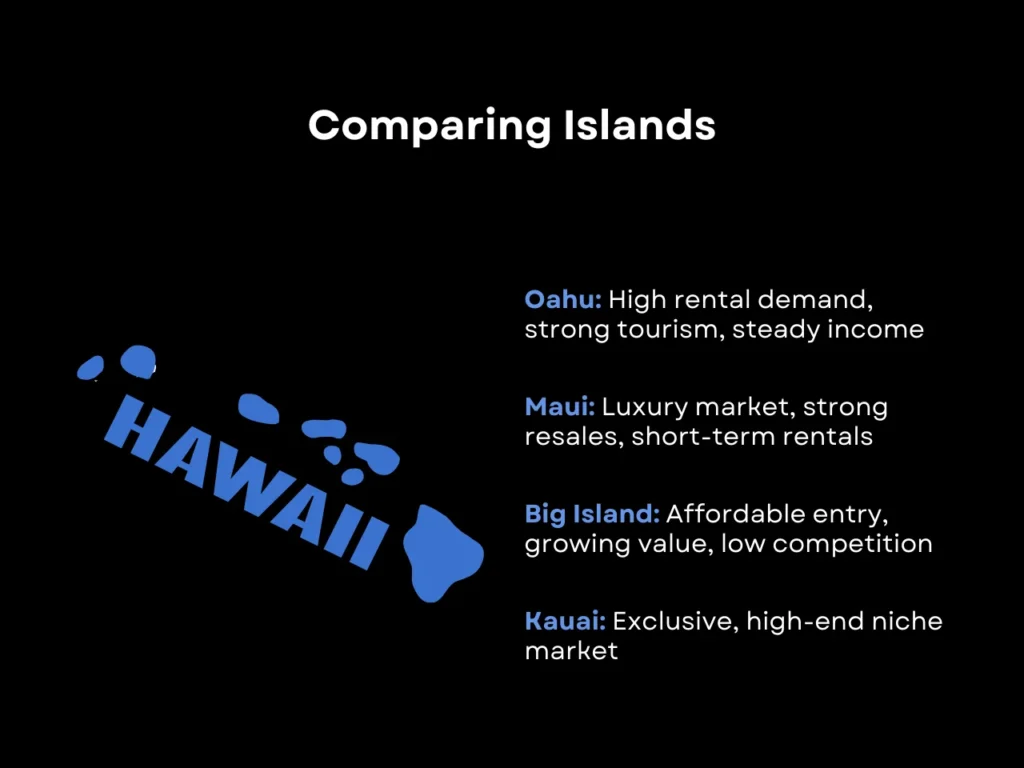
Hawaii Homes for Sale FAQ
Are Hawaii home prices expected to drop in 2025?
While experts predict that price increases may slow down across the US, Hawaii’s limited land availability and continuously high demand make significant drops unlikely. Some experts, such as Coldwell Banker Island Properties, even predict that median prices for single-family homes will break the $1,100,000 mark by the end of 2025.
What types of properties offer the best ROI for investors in Hawaii?
The types of properties that offer the best ROI depend on the specific location you’d like to invest in. Residential rentals will provide the most consistent returns on Oahu, the most densely populated island, while luxury vacation homes are showing high levels of appreciation on Kauai, where land is more of a premium and is sought after by high-net-worth individuals seeking exclusivity.
Are DSCR loans a good option for financing vacation rentals in Hawaii?
Yes, especially if the vacation rental you’d like to finance is highly in demand. A rental that has occupants year-round will be able to show consistent rental income, which boosts its debt service coverage ratio (DSCR), leading to favorable mortgage terms.
Which islands have the most profitable real estate opportunities?
Luxury properties on Maui and Kauai can provide the highest profits thanks to their high appreciation, but the cost of entry is much higher than with luxury properties on the mainland.
How do Hawaii’s short-term rental laws impact real estate investors?
The immediate effect of the new STR laws is the reduction of the supply of properties eligible to be used as STRs. With thousands of rentals scheduled for conversion into long-term housing, investors must now compete for appropriately zoned properties, or pivot their strategies toward other property types such as mid-term rentals (MTRs).
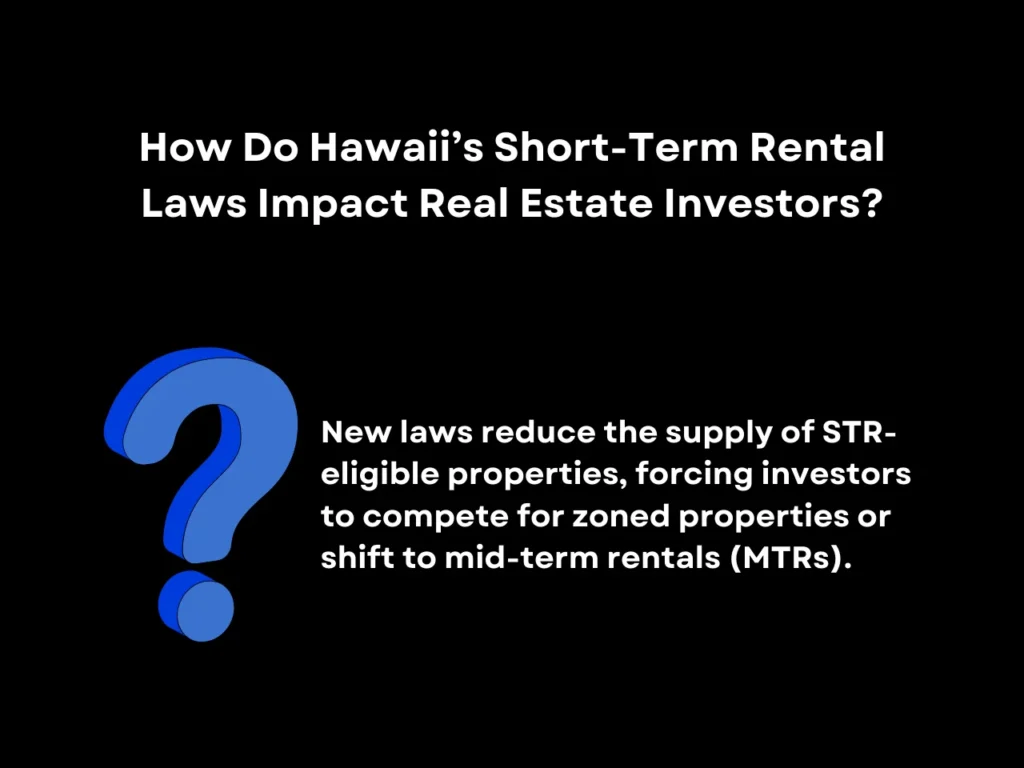
Key Takeaway
Hawaii real estate remains a strong bet for investors. Buy-and-hold investments in high-appreciation areas, mid-term rentals for stable cash flow, and high-yield luxury properties continue to generate strong returns. DSCR loans provide a flexible financing solution for each of these strategies, making it easier for investors to scale their portfolios. Jumbo loans are also worth considering for properties valued in excess of $3,000,000, which are common in exclusive neighborhoods like Kilauea and for certain upscale properties.
If you’re interested in browsing through listings of Hawaii homes for sale, remember to seek out properly zoned vacation rentals, mid-term rental opportunities, and areas exhibiting high demand or healthy growth.
Ready to explore DSCR loans and other financing options such as jumbo loans and P&L loans? Schedule an appointment with Defy today and let our mortgage experts help you figure out your winning strategy.

About the Author: Meet Todd Orlando, co-founder and CEO of Defy Mortgage and Defy TPO. With over 20 years of experience in banking and financial services at institutions like First Republic and Morgan Stanley, Todd has dedicated his career to broadening access to lending and revolutionizing the mortgage industry, particularly in the non-QM space.
In 2022, Todd launched Defy Mortgage to provide real estate investors, entrepreneurs, and self-employed individuals with a secure, streamlined, and personalized lending experience tailored to meet their specific needs. He knows firsthand how access to the right mortgage can make or break a project and how today’s borrowers need flexible financial partners and creative lending options designed for their unique needs and lifestyles. Traditional banks are rigid, and their one-size-fits-all approach is outdated. That’s why he created Defy Mortgage — to stay ahead of the curve, set new standards in lending, and deliver personalized, non-traditional solutions for those looking to purchase or refinance.
For the third year running, Todd has been recognized by Inman News for excellence in the mortgage and lending industry, landing on their prestigious Best of Finance list for 2025. He was also honored as a mortgage finance leader in 2023 and 2024 for the same award. His visionary leadership has earned him endorsements from esteemed former colleagues at prestigious institutions across the financial services spectrum.
Beyond his work in finance, Todd is also a co-founder of two software companies in commercial lending and healthcare tech, an active real estate investor, and a husband and father of three. An industry disruptor, Todd is here to redefine what’s possible in mortgage lending.
Mortgage broker itching to elevate client offerings? Check out our TPO business, Defy TPO: https://defytpo.com/




